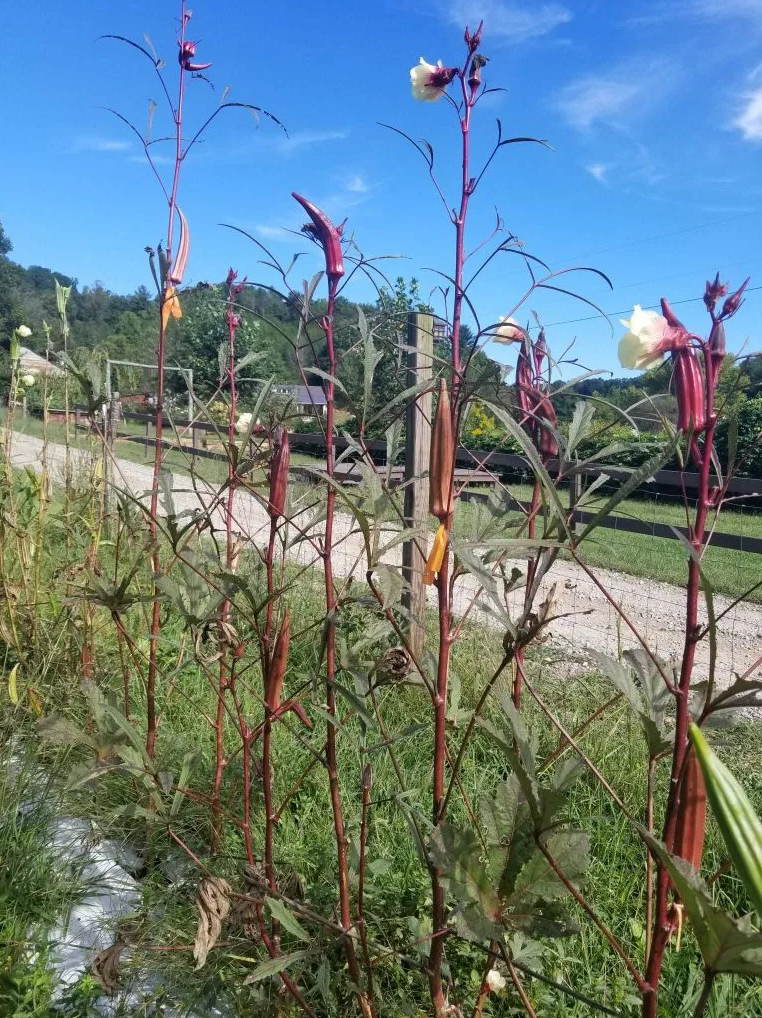If, in this election year, “Okra 2020” sounds like a political slogan, it’s a good campaign to bet on. The agricultural, sustainability-driven initiative began last year when Slow Food Asheville adopted the oft-maligned vegetable for its annual Heritage Food Project.
Previous honorees have included Nancy Hall sweet potatoes, Cherokee Trail of Tears pole beans, Cherokee Purple tomatoes and North Georgia Candy Roaster squash, but this is the first time SFA has put okra on the pedestal. Charles Wise, an SFA board member and home gardener, says the decision arose from his own interest in what he calls “a truly elegant plant.”
Wise found himself inspired after attending author Chris Smith’s book signing for The Whole Okra: A Seed to Stem Celebration at Malaprop’s Bookstore/Cafe last June. (Whole Okra was announced earlier this month as a James Beard Foundation Book Award finalist in the Reference, History and Scholarship category.) “I invited him to collaborate with us, and he was very enthused,” Wise recalls. “We had ongoing conversations about okra varieties that would fit our Heritage Food model, which considers historical integrity to the Appalachian region.”
The okra ultimately selected for the 2020 project, Aunt Hettie’s Red, boasts both regional roots and modern acclaim. Last September, “The Single Biggest Chef-Centered Okra Tasting Day Ever” was staged by the Utopian Seed Project, of which Smith serves as executive director, with simultaneous contests in Asheville, Charlotte and Durham. Of the 54 okra varieties facing off that day in a series of elimination rounds, the last okra standing was Aunt Hettie’s Red.
Okra on the move
Okra 2020 was scheduled to kick off with a March 30 celebration at Archetype Brewing. But when restrictions on public gatherings due to COVID-19 canceled the event — and postponed tailgate markets, at which the SFA had planned to give out seed packets — organizers scrambled to implement other options. Arrangements are now in place for the project to have a presence at the River Arts District Farmers Market on Wednesday, May 13, and Wise urges people interested in future market dates to check his organization’s website and social media.
The coronavirus pandemic did not, however, disrupt the distribution of seeds to several local farms that had already been enlisted to grow substantial quantities of Aunt Hettie’s Red. Those partners include Patchwork Urban Farm in Asheville, Franny’s Farm in Leicester and Mighty Gnome Market Garden in Marshall.
Danielle Keeter, who has owned Mighty Gnome (formerly Stonecrop Garden) with partner Mark McDonagh since 2017, says Wise invited their farm to join the project after seeing their Burgundy Red and Clemson Spineless okra at Asheville City Market. “I love to grow okra,” Keeter enthuses. “They’re beautiful and hardy plants that grow tall and don’t require a lot of special care. They have a really big yield per plant and a long harvest, from about mid-July until the first frost.”
The farmers received enough seeds for up to 200 plants in late April. The Mighty Gnome owners started theirs in trays in their new germination chamber, which they were able to purchase through a grant from the N.C. Tobacco Trust Fund Commission, and plan to put the okra outside after the last frost passes, shortly after Mother’s Day.
Grounded in community
Another route for Western North Carolina to experience Aunt Hettie’s Red is through the nonprofit Bountiful Cities and its Asheville Buncombe Community Garden Network. The project resonates both professionally and personally with Bountiful Cities outreach coordinator Cathy Cleary, who is also a cookbook author and farmer. “I love okra but I’ve not grown it because my husband hates it,” she says with a laugh. “This project means I have to grow it.”
Through the Okra 2020 project, SFA gave 30-seed packets for Bountiful Cities to share with about 40 community gardens. “The idea is to increase biodiversity by enabling people to grow things where seeds can easily be saved and used the next year,” says Cleary.
Interest is high, Cleary continues, particularly as more residents take up gardening in response to COVID-19. “The response was unprecedented,” she says. “We had to move the pickup point to my front porch [in West Asheville], but people are coming from as far as Black Mountain to pick up these little packets of seed.”
In addition to the seeds, community gardeners receive an email with growing tips, a reminder to save some seeds for future planting and a promise to communicate through the growing season with further advice. In return, Bountiful Cities is asking gardeners to share photos of their gardens, as well as some of their harvest with communities experiencing food insecurity.
A new collaboration with the Appalachian Sustainable Agriculture Project will also result in 500 packets of Aunt Hettie’s Red seeds going out in late May. ASAP’s Growing Minds Farm to School Program will send the seeds home with pre-K and elementary students in Buncombe, Haywood, Henderson and Transylvania counties for their families to plant.
Plans to provide Asheville restaurants with okra to use on their menus are currently on hold. But the vegetable enjoys a long season and a big yield, and Cleary is certain that no okra will go to waste. “Who knows? Maybe we’ll pickle it and sell jars as a fundraiser,” she says. “The okra possibilities are unlimited.”



Before you comment
The comments section is here to provide a platform for civil dialogue on the issues we face together as a local community. Xpress is committed to offering this platform for all voices, but when the tone of the discussion gets nasty or strays off topic, we believe many people choose not to participate. Xpress editors are determined to moderate comments to ensure a constructive interchange is maintained. All comments judged not to be in keeping with the spirit of civil discourse will be removed and repeat violators will be banned. See here for our terms of service. Thank you for being part of this effort to promote respectful discussion.